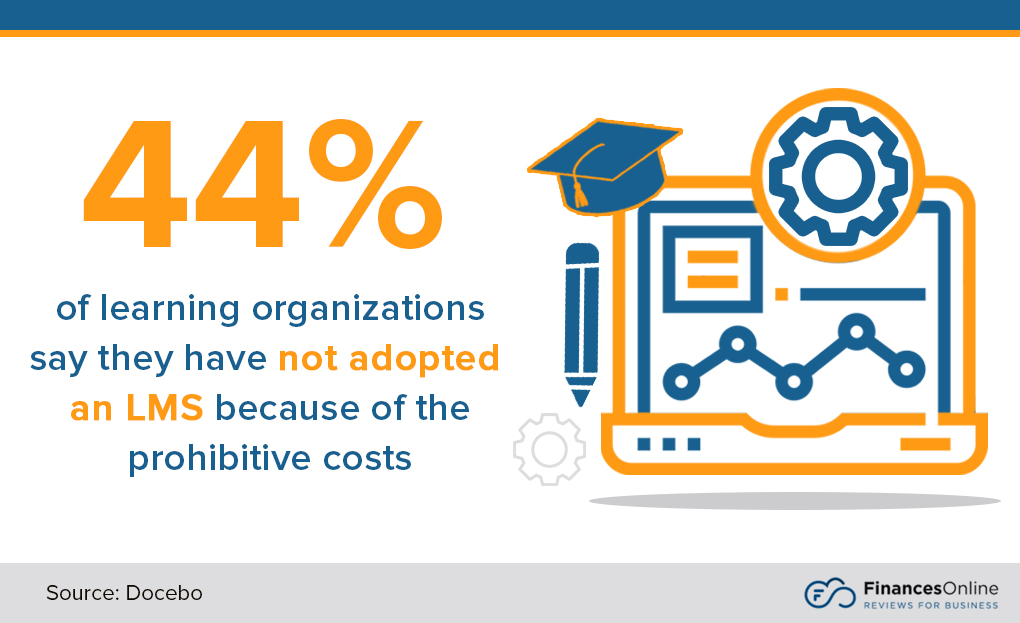School closures are making students, school administrators, and educators turn to standard learning alternatives. This could be in the form of free resources for remote learning or their paid counterparts. With these, students can continue to acquire knowledge and life skills even during the coronavirus pandemic. However, for a systematic approach to distance or remote learning, the use of a learning management system or LMS is imperative.
In this age, when learning does not have to be limited to physical classrooms, these resources and an LMS will prove to be crucial. Not everyone is familiar with the latter, however. And those who are utilizing it may not be maximizing the tool’s abilities. We have prepared this list of resources and the accompanying guides to help you optimize the use of learning management systems.

Free Resources for Remote Learning
Elearning is seen to continue to propel forward. By 2020, the global elearning market will reach $31 billion. This is no surprise since educational institutions are expected to increase their expenditure on learning technology. After all, 90% of students prefer online to classroom learning. On top of that, US college students believe that digital learning technologies assist them in their studies.
Despite the popularity of LMS, organizations still have difficulty adopting it. Indeed, 44% say LMS cost is a major adoption barrier. Meanwhile, 24% find LMS features limited and lacking in mobile adaptability. This is understandable, as many learners like to access learning materials on their mobile devices, too. Additionally, 24% of academic users want excellent customer experience.

Those impediments have ready solutions, however. In this article, you will find a list of free LMS, apart from online teaching tips and strategies. Educators and school administrators alike can also experience them through demos before implementing them.
Free Resources for Remote Learning
The coronavirus pandemic has shuttered schools at all levels across America. However, this should not be a barrier to learning. Below, we present various remote learning resources for students of all levels. These are subdivided into pre-school and elementary, high school, and for different grades or levels.
Learning Resources for Students
In this section, you will find sites and web apps that students can utilize to continue learning amidst the pandemic lockdown.
Preschool and Elementary Resources
- Impact Science – Lessons for School Closures (Science) – You can find science resources in this shared Google Drive site.
- I Know It (Mathematics) – K-5 students will find engaging lessons in math on this site, which offers free access for 90 days.
- Prodigy (Mathematics) – This math platform lets students do self-paced practices of math problems.
- Reflex (Mathematics) – Learning materials in basic math functions are available on this site. Free access is only for 60 days.
- Supporting Students Away from School (Mathematics and Reading) – Printable at-home packets are downloadable from this website.
- Mystery Science (Science) – These mini- and full-lessons are suitable for young children.
Middle School and High School Resources
- LONG + LIVE + MATH At Home: Free Math Resources for COVID-19 School Closures (Mathematics) – Carnegie Learning offers this library of resources for students as well as a math software.
- Virtual Manipulatives (Mathematics) – This interactive site by Didax enhances the learning of mathematics at home with virtual manipulatives.
- Re-imagining Migration: Learn at Home Collection (Social Studies) – Students can learn about transitioning from traditional to virtual learning with the help of these high-quality resources.
- Tyto Online (Science) – Students can learn to solve science problems on this platform.
- Science Music Videos (Science) – Science and music? Yes! Students can have fun learning science with science music videos.
College and Adult Learner Resources
- The Art of Education University (Art) – This is a resource for adult learners who are interested in arts.
Resources for Different Levels
- Kendall Hunt (Various) – K-12 students can find free resources in all subjects here. There are resources for parents as well.
- Scholastic (Various) – Scholastic provides these learn-at-home materials for young learners.
- ASU for You (Various) – Resources for learners of every level are available on this site by the Arizona State University.
- Online Teaching Resources for Teachers and Families (Various) – Parents who are assisting their children can get learning resources from WideOpenShcool.
- Free Online Educational Resources from World Trade Press (Social Studies) – World Trade Press provides free access to six databases.
- Online Civic Learning Opportunities (Social Studies) – Students can join sessions and lectures by the National Constitution Center.
- ExploreLearning support during Coronavirus outbreak (Mathematics and Science) – Parents and learners can find engaging learning resources for math and science here.
- OpusYou (Music) – If you are a student interested in music, you can get on-demand lessons from OpusYou.
- Remote Learning with Reading Plus (Reading) – Parents can download a packet of worksheets, writing prompts, and organizers for their students and print them out.
- Studies Weekly (Various) – Now free to support learning during the pandemic, Studies Weekly has resources for multiple subjects.
- Free Independent Learning Packs for Distance Learning (Science) – Parents and students can find independent learning packets here for every grade level.
Teaching Resources
As expected, teachers have their resources provided by the school or which they gathered by themselves. Still, they can benefit from resources posted online that can augment class discussions. There are even ideas for activities, projects, and homework. Though these are listed under teaching resources, some of these sites are suitable for students’ independent learning as well.
Preschool and Elementary Resources
- More Online Resources from NCTM (Mathematics) – This is a list of online resources compiled by the National Council of Teachers of Mathematics.
- Pre-School Children (Language) – This is a catalog of resources for teaching language to pre-schoolers.
- Young Learners (Language) – Teachers can discover various resources on language teaching for young learners here.
- New American History (History) – This site has history materials for grade four students and higher.
- 123Homeschool4Me (Various) – You can find printable worksheets here that are suitable for young learners.
- 2Simple (Various) – This is a website that offers a few no-cost resources.
- The Fable Cottage (Language) – Keep young language learners interested through these bilingual fairy tales and fables.
- Scratch (Various) – You can make learning more fun and interactive by creating stories, games, and animations.
- OLogy (Science) – Educators can find resources for a broad range of scientific fields on this site.
Middle School and High School Resources
- Teenage Learners (Language) – You can find a variety of materials for teaching language to teenagers.
- UC Scout (Various) – The University of California offers free courses for high school students, which teachers can leverage.
- Stanford History Education Group (History) – Teachers can integrate these resources into their history classes.
- Google Applied Digital Skills (Computer) – You can find practical lessons in computer skills here, courtesy of Google.
- Digital Civics Toolkit – Getting students interested in civics is made easier with this digital resource.
College and Adult Learning Resources
- Teaching Adults (Language) – This Oxford Teachers’ Club section has courses for college and adult learners.
Resources for Different Levels
- Teaching Materials (History) – Get lesson plans and materials for different subjects in history.
- Teaching resources (Science) – A library of science teaching resources by The University of California Museum of Paleontology, Berkeley.
- Classroom Resources (Science) – The National Science Foundation has resources for diverse topics in science.
- Teacher Resources (Various) – The Library of Congress provides teaching materials to educators.
- Learning Resources (Art and Humanities) – The National Gallery of Art has resources to aid educators in teaching the arts.
- PBS Learning Media (Various) – PBS has learning materials teachers of different grade levels can use.
- ReadWorks (Reading) – This site has free content and tools to augment reading comprehension.
- Big History Project (Social Studies) – Amplify your social studies discussions with the help of the Big History Project.
- Discovery K12 (Various) – You can find standard courses here that can help you teach students even when they are at home.
- Khan Academy – Khan Academy has free resources for educators who wish to supplement their online classes.
- Math Resources for Teachers (Mathematics) – If you are a math teacher, you can find materials here that can help get students interested in numbers and symbols.
- ProjectGutenberg (Various) – A trove of free reading materials, ProjectGutenberg lets you find books for any subject.
- ReadWriteThink (Reading and Language) – Classroom resources for reading and writing are available on this website by the International Literacy Association.
- EDSITEment! (Humanities) – Humanities studies can be enhanced with lesson plans and materials from this website.
- PhET (Science and Mathematics) – Interactive simulations for science and math can make classes more enjoyable.
- Google Arts & Culture (Arts and Humanities) – This arts and culture website by Google has a plethora of resources teachers can use in discussions.
Remote Learning Technology
The free resources listed above are best used in tandem with a learning management tool. However, schools with limited budgets may find it difficult to invest in one. Fortunately, there are systems from reliable vendors that are free and can support the needs of schools of any size. By using these, educational institutions can systematize the delivery of classes and learning materials. On that note, we list a few of these essential free resources for remote learning in the form of LMS for you to check:
- TalentLMS. This top-rated LMS is highly configurable. It is designed for online courses, seminars, and other kinds of training.
- Schoology. This engaging platform makes it easy for students and instructors to interact. It even has a portal reserved for parents.
- Google Classroom. Schools worldwide use this offering by Google. It comes with access to other Google products.
Setting Up Remote Learning
We earlier showed you where you could find free learning resources for different subjects if you are a parent or a student. Plus, there are also links where teachers can find additional materials to augment their online classes. But remote learning or distance learning is more than just distributing worksheets, giving reading assignments, and the like. For online learning to be truly successful, understanding the concept and setting up the program and LMS are important.
Understanding Remote Learning
Remote learning, distance education, online learning, and elearning. These are terms that refer to the same thing: education or training online. Since the COVID-19 pandemic exploded, businesses and schools have shuttered and resorted to remote work management and Internet-based instruction instead. Though the concept has been around for many years, not everyone is familiar with it. In this section, you will find links to resources that can help you get acquainted with distance learning.
What is distance learning?
- Distance learning – This online encyclopedia entry about remote learning gives a comprehensive description of the practice or concept.
- What Is Distance Education? – Read the definition and history of distance education in this detailed article.
- What Is Distance Learning? And Why Is It So Important? – Aside from learning what distance learning is, you can read about its importance in this piece.
- What’s the difference between online and distance learning? – This blog post by the University of Essex Online differentiates distance learning from online learning.
- What is a Distance Learning Course? – This lesson by Study.com lets you understand the distance learning course better.
Pros and cons of distance learning
- Advantages and Disadvantages–Why Choose Distance Learning? – If you are a student deciding whether to take up distance learning, this can aid you in making a decision.
- Weighing The Positives And Negatives Of Remote Learning – Remote learning has both positive and negative aspects. You can read about them here.
- Will Shift to Remote Teaching Be Boon or Bane for Online Learning? – How does remote teaching affect online learning? This article discusses the issue.
Getting Started with Remote Learning
How do you implement remote learning? In this section, you will find guides to configuring or planning your online learning program.
Planning for remote learning
- SHP Flexible Plan for Instructional Continuity – This Google Docs document by Sacred Heart Schools Preparatory aims to help teachers and schools to make the most of the best practices for free resources for remote learning.
- Planning for Elementary School Closures – How can elementary schools deal with closures during the time of coronavirus pandemic? This article offers answers.
- School Closure & Remote Learning Resource Planning Guide – This is a newly updated guide for educational institutions in planning remote teaching and learning.
- Looking Ahead: Creating Your 2020 Remote Learning & Development Plan – This blog post outlines the steps you need to take to craft a remote learning and development plan.
- Six Steps Toward Planning for Remote Learning – This step-by-step guide assists you in coming up with a reliable remote learning plan. Plus, there is a downloadable template.
Techniques for Managing Students in a Virtual Classroom
You need special skills and tricks to make sure students remain engaged in online classes. Here, we list resources that offer tips and tricks that can help teachers actually do some teaching.
- 5 Ways Of Keeping Online Students Engaged And Teachers Involved – This has tips for teachers on how to connect with their students online. On top of that, it offers advice on how to keep themselves engaged as well.
- How to Better Engage Students in Online College Courses – College students can be as challenging as primary and secondary pupils. This article outlines how teachers can engage them in online classes.
- Engaging Online Learners: 5 Lessons From an Early Adopter – As early as the 1990s, online learning was becoming a thing. In this article, an early adopter presents five lessons that other educators can peruse.
- 7 Tips for Increasing Student Engagement in Online Courses – It can be challenging to engage students in online classes. This piece gives seven tips for keeping students engaged in virtual classrooms.
- 7 Ways to Increase Online Student Engagement – If you want to be effective in an online classroom, you need to apply certain techniques. This article presents seven that can help.
- 7 Strategies to Gamify Your Online Courses – There is no reason why online courses cannot be as fun as physical classes. These seven gamification tips can help boost your remote classes.
- Moving Your Class Online? Tips for Keeping Students Engaged – This recent article offers more guidance to teachers in managing their classes
Essential Things to Remember for LMS Administrators
This list of resources is for LMS administrators. With these materials, they can streamline the experiences of all users.
- Top 5 Skills Every LMS Admin Should Have – Exactly what skills do your LMS administrators need to be effective? This article lists down five essential abilities for successful LMS administration.
- 7 Tips for Ongoing LMS Success: Making LMS Administration Sexy – Now, you have the necessary LMS administration skills. How do you apply them? In this piece, you can find ways to improve your organization’s elearning courses.
- 40 Things I Wish I Knew as a Learning Management System (LMS) Admin – An experienced LMS administrator shares 40 lessons learned on the job.
- Security Awareness Tips for LMS Administrators – One of the important aspects of LMS is security. This article shows LMS administrators critical points where they have to be vigilant.
Tricks for Parents Supervising Children
For some parents, instructional technology is a new thing. On top of dealing with the changes brought about by the coronavirus pandemic, they have to learn how to navigate an LMS, too. Plus, they need to supervise young children to ensure that they are making good use of the tool for educational purposes. The links below aim to assist guardians for productive remote learning at home.
- Tips and Tricks for the Parents of Remote Learners – This instructional video interactively educates parents on how to help students continue their education at home.
- Beyond the Interview: Parent Engagement in the Modern Era – Educators and school administrators need to bring parents in the loop, too. This article is targeted towards teachers who need pointers on communicating with guardians.
- 4 Tips to Parents for Online Learning Success – This is a comprehensive guide for parents who are just getting started with LMS.
Laying the Groundwork for Success
LMS success does not happen overnight. It requires careful planning, strategic implementation, and trial-and-error. A huge bulk of that falls on the shoulders of school administrators and teachers. Ultimately, they are the ones responsible for configuring the LMS. Plus, they are responsible for making courses and learning materials accessible.
Unfortunately, the closure of educational institutions and their organizing bodies may have upended the process. There is little time put in planning LMS implementation, and every party involved is taking it by the day. As of now, what educators and administrators can do is ease students into the transition. Parent engagement is crucial, too, as they need to supervise young learners in using educational technology.
Additionally, everyone must learn the ins and outs of the LMS in use. In this way, users can draw out a system’s potential and use it to the fullest. On that note, it can help to be familiar with the features of LMS software.


























Leave a comment!